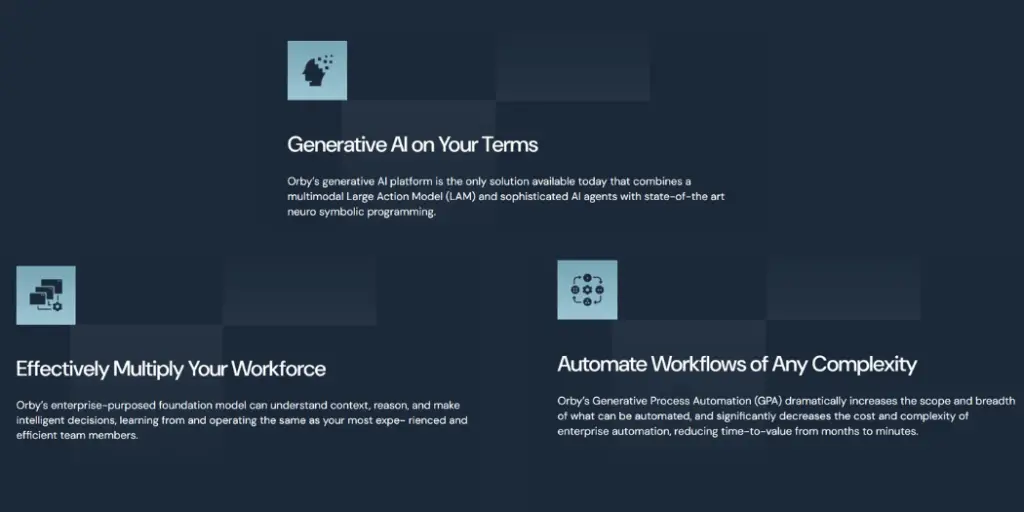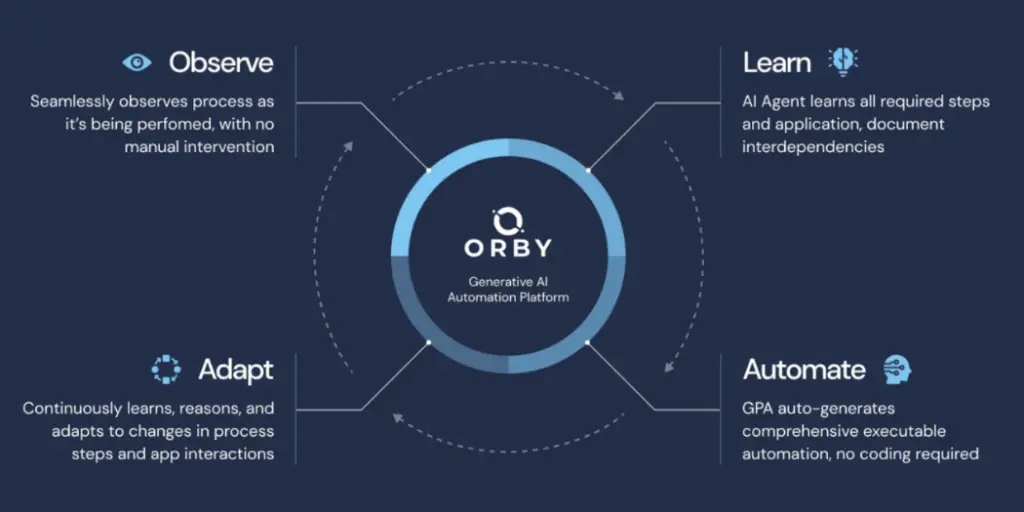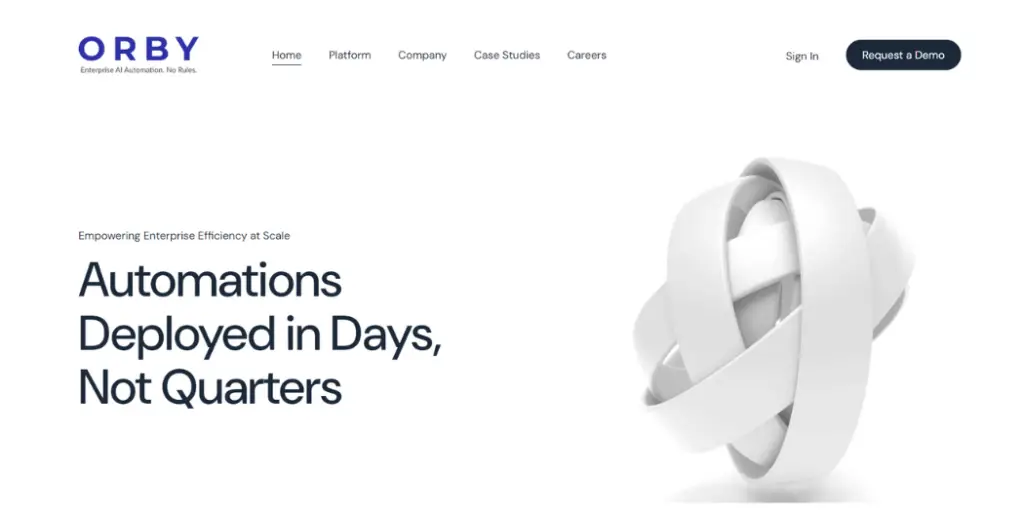AI agents have emerged as a promising solution for streamlining business processes. These generative AI models can autonomously perform a variety of tasks, such as transferring information from emails to spreadsheets, potentially revolutionizing productivity.
Challenges remain as these models can still make errors. Despite this, many founders, analysts, and investors are convinced that AI agents represent the next significant leap in generative AI.
Orby AI, founded by Bella Liu and William Lu, is at the forefront of this innovation. The company is developing a generative AI platform designed to automate various business workflows, including data entry, document processing, and form validation.
Liu and Lu’s vision for Orby AI extends beyond simple automation; their platform aims to understand and act on workflows in real time, adapting to an enterprise’s unique patterns and data structures.
With Orby AI, the founders hope to free employees from mundane tasks, allowing them to focus on more strategic activities.
Background of Founders
Bella Liu and William Lu bring a wealth of experience and expertise to Orby AI, positioning the company for success in the competitive field of enterprise automation.
Bella Liu, Orby AI’s CEO, has a distinguished background in AI and automation. She previously led AI and automation efforts at IBM, where she was involved in product planning and AI-related mergers and acquisitions.
Liu also served as the Director of AI Product Management at UiPath, a leading company in robotic process automation.

William Lu, Orby AI’s co-founder, has an impressive track record in the technology sector. He began his career as a systems engineer at Nvidia, a role that honed his skills in advanced computing technologies.
Later, Lu joined Google Cloud as an engineering lead, where he played a crucial role in designing generative AI technologies for document and database extraction.
Their combined expertise in AI, automation, and cloud technologies provides a strong foundation for Orby AI’s innovative approach to enterprise automation.
The Concept of AI Agents
AI agents are a groundbreaking development in the field of generative AI, designed to perform tasks autonomously, thereby enhancing productivity.
These agents can handle a range of activities, from copying information from emails to pasting it into spreadsheets, which traditionally require human intervention.
By automating such repetitive tasks, AI agents promise to significantly reduce the workload on employees, allowing them to focus on more complex and creative aspects of their jobs.
The journey towards fully reliable AI agents is ongoing. Despite their potential, these models still face challenges, such as a propensity for errors and the need for continuous learning and improvement.
This has led some to believe that the widespread adoption of AI agents as productivity superchargers might be premature. Yet, many industry leaders, including founders, analysts, and investors, remain optimistic about their transformative potential.
Orby stands out in this space with its unique approach to developing AI agents. Unlike many existing tools that offer automation for back-office processes, AI’s platform is designed to learn and act on workflows in real time.
This involves understanding the patterns and relationships within an enterprise’s unstructured data, enabling more nuanced and adaptable automation.
By observing how employees perform their tasks, AI agents can generate and refine automation, making them capable of handling complex tasks that require a certain level of reasoning and understanding.
This innovative approach positions Orby AI to lead the next wave of advancements in generative AI, promising a future where businesses can leverage these agents to streamline operations and improve overall efficiency.
Orby AI’s Unique Approach
Orby distinguishes itself in the competitive field of enterprise automation with a unique approach that focuses on real-time learning and adaptation.
Unlike many automation tools that rely on pre-defined scripts or rules, Orby AI’s platform uses generative AI to observe and learn from the actions of employees as they perform their daily tasks.
This capability allows the platform to understand and automate workflows that involve data entry, document processing, and form validation with a higher degree of accuracy and flexibility.

One of the standout features of Orby AI is its ability to comprehend unstructured data. Traditional automation solutions often struggle with unstructured data, which is prevalent in business environments.
This technology can identify patterns and relationships within this data, enabling it to automate tasks that require a deeper understanding of context and nuances.
Orby AI’s platform is designed to create automation on the fly. By continuously monitoring how workers perform their tasks, the AI agent installed on a worker’s computer learns to generate automation for complex tasks that involve some level of reasoning and decision-making.
This real-time learning capability means that Orby’s AI agents can quickly adapt to changes in workflows, such as updates to an application’s user interface, by analyzing API interactions and a worker’s browser usage.
Another significant aspect of Orby AI’s approach is the integration of symbolic AI with traditional AI models. Symbolic AI, which relies on rules and logic, can be inflexible and slow when dealing with large datasets.
Orby AI has found a way to combine symbolic AI with conventional AI architectures to achieve scalability and adaptability. This hybrid model enhances the platform’s ability to handle complex tasks efficiently.
In terms of data privacy and security, Orby AI has implemented robust measures to protect customer data. The platform uses telemetry data to improve its models, ensuring that this data is encrypted both in transit and at rest.
Importantly, Orby AI does not store most customer data, alleviating concerns about privacy breaches.
By focusing on real-time learning, understanding unstructured data, and combining symbolic and traditional AI, Orby AI offers a sophisticated solution that stands out in the crowded field of enterprise automation.
This approach not only enhances the efficiency of business operations but also frees employees from mundane tasks, allowing them to concentrate on more strategic and value-added activities.
Technology Behind Orby AI
Orby AI’s technological foundation is a sophisticated blend of generative AI and symbolic AI designed to create a highly adaptive and intelligent automation platform for enterprise applications.
This combination enables Orby AI to learn and respond to business workflows in real-time, offering a level of flexibility and precision that sets it apart from traditional automation tools.
At the core of Orby AI’s platform is its ability to observe and learn from the actions of employees. The AI agent, once installed on a worker’s computer, continuously monitors how tasks are performed.
This real-time learning capability allows the platform to generate automation dynamically, adapting to changes in workflows and user interfaces.
For example, suppose a business application undergoes an update. In that case, Orby AI can adjust its processes by analyzing API interactions and browser usage patterns, ensuring that the automation remains effective without requiring manual reprogramming.
Orby AI excels in handling unstructured data, which is often found in enterprise environments. Traditional automation solutions typically struggle with this type of data, as it lacks a predefined format.
Orby AI’s platform can identify patterns and relationships within unstructured data, enabling it to automate tasks that involve context and nuance.
This capability is particularly valuable for processes like document processing and form validation, where understanding the content is crucial for accurate automation.
A distinctive feature of Orby AI’s technology is its integration of symbolic AI with traditional AI models. Symbolic AI, which relies on rules and logic, provides a framework for the AI to infer solutions to problems using well-defined knowledge and context.
Symbolic AI alone can be inflexible and slow, especially with complex datasets. Orby AI overcomes this limitation by combining symbolic AI with conventional AI architectures, enhancing the platform’s ability to scale and adapt.
This hybrid approach leverages the strengths of both symbolic and traditional AI, resulting in a more robust and efficient system.
Data privacy and security are paramount in Orby AI’s design. The platform uses telemetry data to refine its models, ensuring that this data is encrypted both in transit and at rest.
Orby AI does not store most customer data, reducing the risk of privacy breaches. By keeping humans in the feedback loop, Orby AI ensures that its automation solutions remain aligned with the organization’s needs and standards.
Orby AI’s platform is engineered for scalability, allowing it to handle the increasing complexity and volume of enterprise data. The use of cloud-based generative AI models enables the platform to manage large datasets efficiently, providing consistent performance even as the scale of operations grows.
This scalability ensures that Orby AI can meet the evolving demands of businesses, offering a reliable solution for enterprise automation.
Orby AI’s technology leverages real-time learning, an understanding of unstructured data, and a hybrid approach combining symbolic and traditional AI to deliver a powerful and adaptable automation platform.
These technological advancements enable Orby AI to offer a unique solution that addresses the complexities of modern enterprise workflows, setting a new standard in the field of generative AI for business automation.
Privacy and Data Security
Privacy and data security are critical components of Orby AI’s approach to enterprise automation. Recognizing the importance of safeguarding sensitive information, Orby AI has implemented robust measures to ensure data protection throughout its operations.
Orby AI uses telemetry data to enhance its models, a process that is carefully managed to protect customer information. This telemetry data is encrypted both during transit and when at rest, ensuring that it remains secure at all times.
By encrypting data, Orby AI minimizes the risk of unauthorized access, thereby maintaining the integrity and confidentiality of customer information.
An essential aspect of Orby AI’s privacy strategy is its approach to data storage. The platform does not store most customer data, which significantly reduces the risk of data breaches.
Instead, it focuses on utilizing only the necessary telemetry data for improving its models, ensuring that sensitive information is not retained unnecessarily.

Moreover, Orby AI keeps humans in the feedback loop, ensuring that the automation solutions it develops are continuously aligned with the organization’s needs and standards.
This human oversight not only improves the accuracy and relevance of the automation but also provides an additional layer of security, as employees can monitor and manage the AI’s actions.
Orby AI’s commitment to privacy and data security is further reinforced by its compliance with industry standards and best practices.
The company adheres to stringent data protection regulations, ensuring that its processes meet or exceed the requirements set forth by relevant authorities.
This compliance not only demonstrates Orby’s dedication to data security but also builds trust with its customers.
Orby AI is revolutionizing enterprise automation with its unique approach that combines real-time learning, handling of unstructured data, and a hybrid model of symbolic and traditional AI.
By prioritizing privacy and data security, Orby AI provides a robust and adaptable solution that enhances business workflows while ensuring data protection. This positions Orby as a leader in the next generation of generative AI for businesses.


